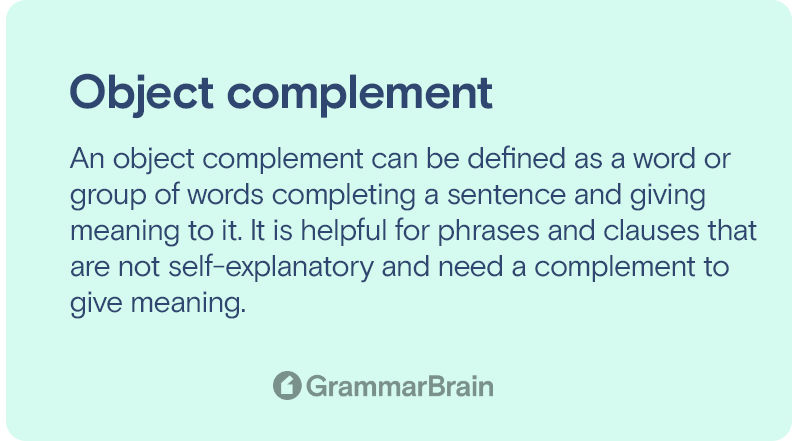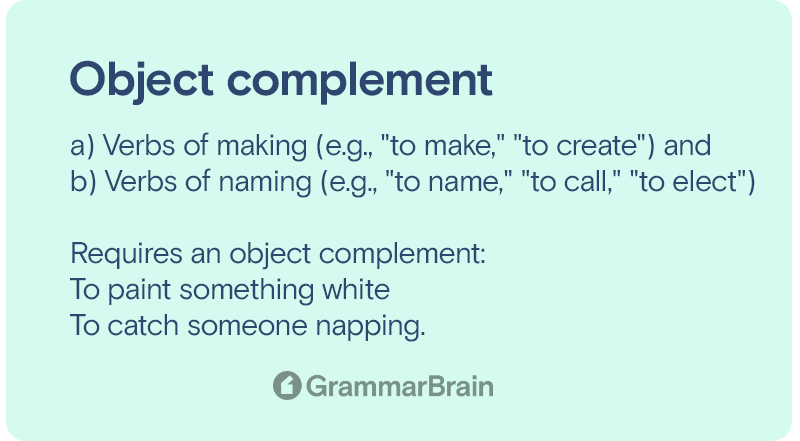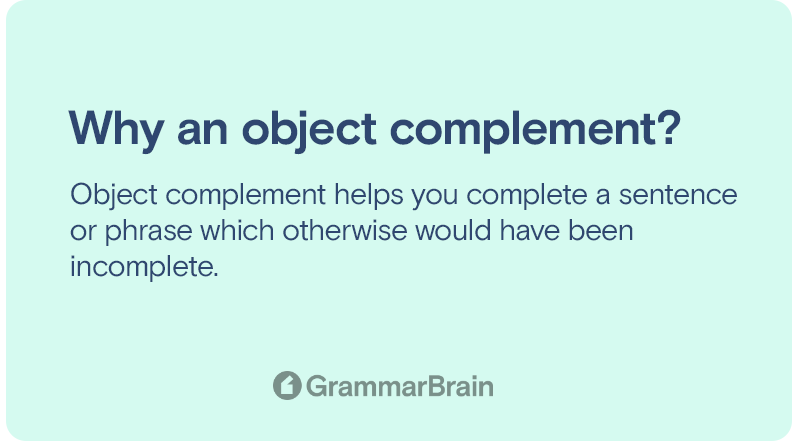What is an object complement? How does an object complement work? An object complement immediately follows a direct object and is used to describe, rename or redefine a sentence. It comes after the direct object of an attributive ditransitive verb or resultative verb.

What is an object complement?
Often, we don’t pay attention to what we speak or the words we use. This causes us to make mistakes or be unclear about what we intend to share. An object complement mitigates this by giving it meaning, redefining it, or describing a direct object to rename or describe it. It states what the direct object has become or provides more information about the direct object in the sentence.
Definition
An object complement can be defined as a word or group of words completing a sentence and giving meaning to it. It is helpful for phrases and clauses that are not self-explanatory and need a complement to give meaning. Knowing how to spot and use an object complement will help you articulate and write better.
How does an object complement work?
An object complement describes or renames a direct object and can be paired with a noun, noun phrase, pronoun, adjective, or adjectival phrase. An object complement is commonly used when using verbs related to making or naming.
Learn more about object complement here.
What is the Function of an Object Complement?
Object complements rename or describe the direct object, it can also identify a subject.
Additionally, it is used to make sense of and complement an object, subject, or verb. The
function of an object complement is to give meaning to an entire sentence. Therefore, it is impossible to remove it without changing the structure and meaning of a sentence.
How to identify an object complement
An object complement usually follows a direct object or subject to make better sense of the sentence. Click here for more information on how to identify an object complement. It is important to remember that an object complement is either a singular word or it can be a group of words.
Example:
- We caught the thief hiding.
- We caught the thief hiding in the garage.
Object complement examples
Here are a few examples of Object Complements:
- He found Joyce working.
- They selected John as their Captain.
- They named the dog Uthred.
- The professor considered Jason very bright.
- She proved them right.
- My response made my parents sad.
- They found Joyce exercising in the sunroom.
Check out this link if you are still looking for more examples.

Verbs that attract object complements
The verbs that often attract object complements are divided into two.
- a) Verbs of making (e.g., “to make,” “to create”) and
- b) Verbs of naming (e.g., “to name,” “to call,” “to elect”)
Additionally, other verbs might also require an object complement.
For examples:
- To paint something white
- To catch someone napping.
In the examples below, the object complements are bold, while the direct object is in italics.
- To make her joyous
- To name him Frank
Object complements are often linked with verbs such as create, make, appoint, choose, name, call, etc. Find more information here.

Why object complements are important
Being well-versed with object and subject complements helps you write better and be more definitive in your expressions.
Object complement helps you complete a sentence or phrase which otherwise would have been incomplete.
Spoken skills require proper usage of object complement. However, more object complement errors are made while writing. Therefore, it is pertinent to pay importance to its uses.
FAQs
What is the difference between subject complement and object complement?
The main difference is that additional information is added to a subject in subject complements. And additional information is added to a direct object in object complements.
What is an object complement?
An object complement describes or renames a direct object and can be paired with a noun, noun phrase, pronoun, adjective, or adjectival phrase. It is used to complete a sentence and give it meaning.
Can a group of words be used as an object complement?
Yes, an object complement is used either as a singular word or as a group of words to redefine a sentence.
What is an objective complement?
Jane has nice red nails. The word “red” is the objective complement. The subject complement characterizes the subject.
Inside this article
Fact checked:
Content is rigorously reviewed by a team of qualified and experienced fact checkers. Fact checkers review articles for factual accuracy, relevance, and timeliness. Learn more.
Core lessons
Glossary
- Abstract Noun
- Accusative Case
- Anecdote
- Antonym
- Active Sentence
- Adverb
- Adjective
- Allegory
- Alliteration
- Adjective Clause
- Adjective Phrase
- Ampersand
- Anastrophe
- Adverbial Clause
- Appositive Phrase
- Clause
- Compound Adjective
- Complex Sentence
- Compound Words
- Compound Predicate
- Common Noun
- Comparative Adjective
- Comparative and Superlative
- Compound Noun
- Compound Subject
- Compound Sentence
- Copular Verb
- Collective Noun
- Colloquialism
- Conciseness
- Consonance
- Conditional
- Concrete Noun
- Conjunction
- Conjugation
- Conditional Sentence
- Comma Splice
- Correlative Conjunction
- Coordinating Conjunction
- Coordinate Adjective
- Cumulative Adjective
- Dative Case
- Determiner
- Declarative Sentence
- Declarative Statement
- Direct Object Pronoun
- Direct Object
- Diction
- Diphthong
- Dangling Modifier
- Demonstrative Pronoun
- Demonstrative Adjective
- Direct Characterization
- Definite Article
- Doublespeak
- False Dilemma Fallacy
- Future Perfect Progressive
- Future Simple
- Future Perfect Continuous
- Future Perfect
- First Conditional
- Irregular Adjective
- Irregular Verb
- Imperative Sentence
- Indefinite Article
- Intransitive Verb
- Introductory Phrase
- Indefinite Pronoun
- Indirect Characterization
- Interrogative Sentence
- Intensive Pronoun
- Inanimate Object
- Indefinite Tense
- Infinitive Phrase
- Interjection
- Intensifier
- Infinitive
- Indicative Mood
- Participle
- Parallelism
- Prepositional Phrase
- Past Simple Tense
- Past Continuous Tense
- Past Perfect Tense
- Past Progressive Tense
- Present Simple Tense
- Present Perfect Tense
- Personal Pronoun
- Personification
- Persuasive Writing
- Parallel Structure
- Phrasal Verb
- Predicate Adjective
- Predicate Nominative
- Phonetic Language
- Plural Noun
- Punctuation
- Punctuation Marks
- Preposition
- Preposition of Place
- Parts of Speech
- Possessive Adjective
- Possessive Determiner
- Possessive Case
- Possessive Noun
- Proper Adjective
- Proper Noun
- Present Participle
- Prefix
- Predicate



